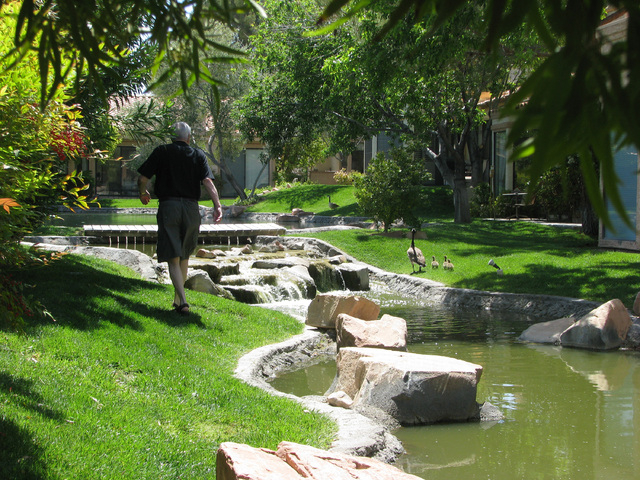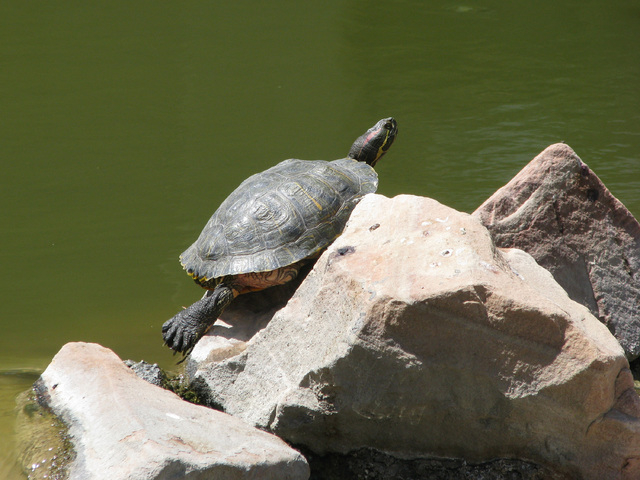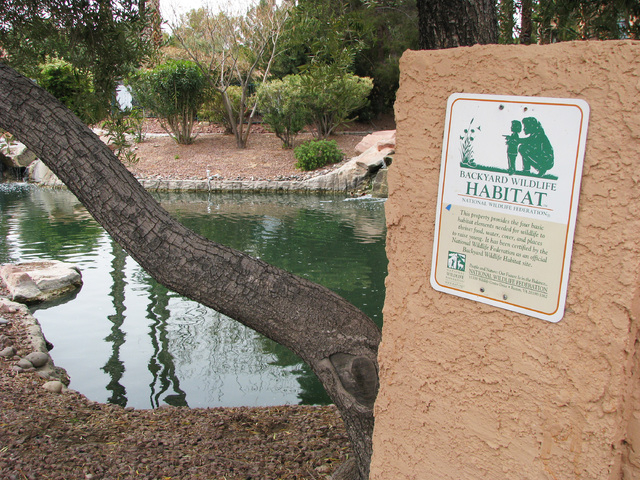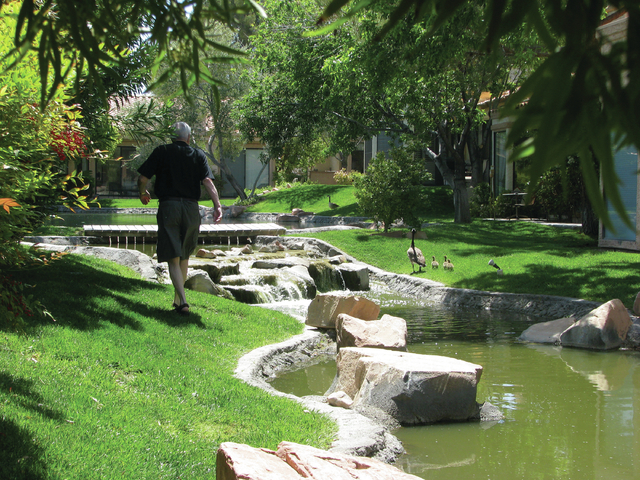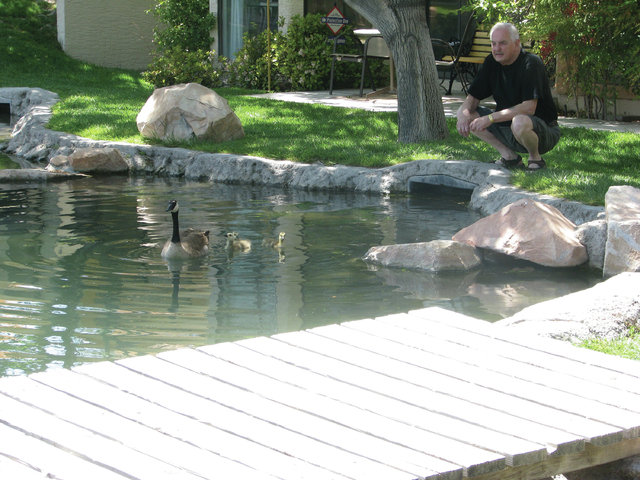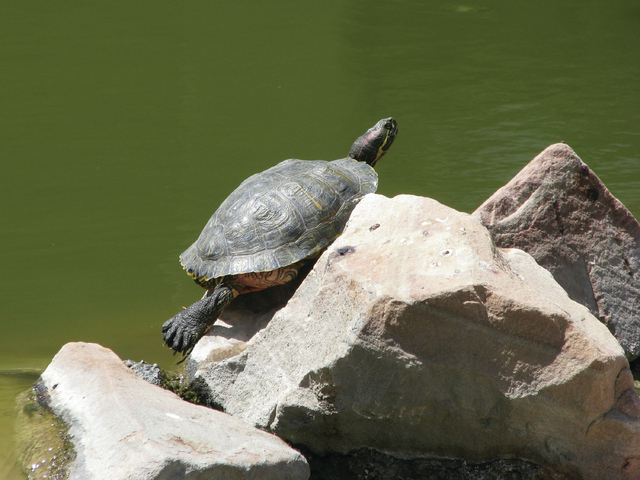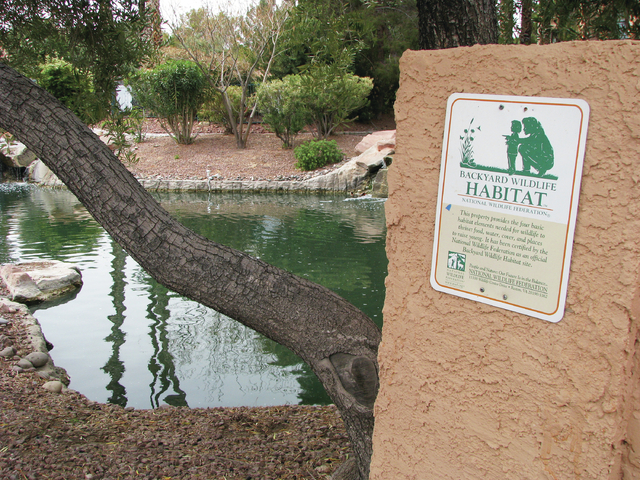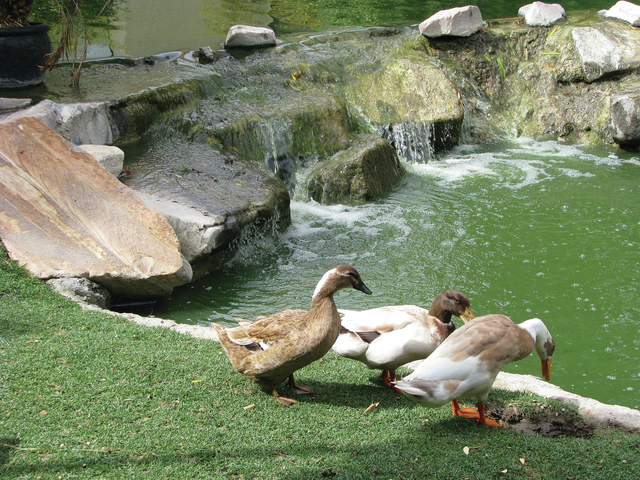Man’s kindness to web-footed creatures ruffles the feathers of homeowners association
No one doubts that Rick Mills is kind to his web-footed friends.
For years he has championed the animals’ cause in his neighborhood. The problem is that some of his neighbors don’t feel he’s been as accommodating to them.
Mills has lived for more than 20 years in the gated community of Paradise Springs, which includes a small lake and stream. The neighborhood comprises 78 single-family homes. Many of the homes’ back doors open onto the shared green space around the water, which also is home to wild ducks, koi, turtles and other wildlife. Mills’ property abuts a small pond in the stream, and for several years he has been taking in injured ducks and allowing them to recuperate there.
On April 5, in compliance with a demand from the property’s homeowners association, Mills removed the ducks. But neither he nor the ducks are happy about it.
“They’ll do OK at my place, but I don’t have anything like they had at Rick’s place,” said Barbara Bogar, a friend who took in the ducks. “I just have a regular back yard. I don’t have anything like that habitat.”
When there were discussions about removing the water feature about 10 years ago, Mills was part of a group of homeowners who worked to have the water feature declared a Backyard Wildlife Habitat by the National Wildlife Federation. To qualify, a place has to be able to provide the essentials wildlife needs: food, water, cover and a place to raise their young.
The community’s front yards have been converted to desert landscaping, but the backyard water feature remains. The water feature and the wildlife are clearly important to the community, as each household pays monthly dues of nearly $400, much of which goes to maintain them.
RULES AND REGULATIONS
Patrick Pernyak, supervising community manager and maintenance supervisor for Ideal Community Management, which handles the community, said the Homeowners Association’s governing documents, rules and regulations forbid anyone from bringing animals to the habitat without written authorization from the HOA and that feeding the animals is greatly discouraged because it’s a wildlife habitat, not a place for domestic animals.
“Initially, the (HOA) board said that since the ducks were already here and had been a great addition to the community, they could stay,” Pernyak said. “The stipulation was that Mr. Mills didn’t bring any more into the community without consulting with the board first and that he didn’t leave food out where it can be eaten by other animals, particularly the geese.”
The real problem isn’t the ducks, Pernyak said, it’s the geese.
“The geese are obnoxious,” said Pernyak. “They’re harassing the fish and the ducks who were already here. We’ve had a gigantic rise in complaints over the last three years from homeowners who are saying the geese are squawking at 10 or 11 at night or 4 in the morning.”
He added that the geese leave waste on patios and nest on roofs. The HOA pays to have the nests removed.
“The majority of the homeowners are fed up with it,” he said.
For several years, the only geese that came to the community were a mated pair of Canada geese that would come back every year to raise another brood of goslings. But many arrived and set up permanent residence when Sunset Park underwent major renovations a few years ago. The community is about a mile and a half from Sunset Park as the crow — or in this case, the goose — flies.
“The geese have been so rough that it got to the point where the ducks weren’t reproducing,” Pernyak said. “We’ve been working diligently to reduce the population of the geese and hopefully eliminate them, so the rest of the environment can reproduce and flourish.”
A LETTER WITH INSTRUCTIONS
When Mills returned from an overseas trip to attend a wedding a few weeks ago, he found a letter informing him that he had been observed leaving food out on multiple occasions, which was in turn feeding the geese. As a result, the letter advised that he needed to remove the ducks and cease feeding the wildlife.
“I’ve got people out here taking pictures of me on my patio, trying to catch me breaking the rules,” Mills said. “There’s one guy who comes by a couple of times a day, just to keep an eye on me. (Rep.) Dina Titus’ mother lives here, and they’ve been taking pictures of her, too. She’s pretty angry about it.”
Titus’ office declined to comment on the situation.
The ducks came to Mills from veterinarian Joanne Stefanatos, who has been taking care of rescued waterfowl in at her Animal Kingdom Veterinary Hospital for 40 years.
“We don’t make any profits in this clinic; it all goes to birdseed,” she said. “We love them. They have to have someone to help them, so I’ve been helping them.”
The animals come to her from private citizens and animal control. Because of the hospital’s proximity to Sunset Park, many of the injured birds come from there.
“They get caught by fishing line or twine, they get hit by the remote control boats and sometimes they get chased and injured by dogs,” she said. “We take them in and get them back on their feet and release them at a couple locations.”
Mills and Bogar are part of a small group who help the waterfowl through the transition from the clinic to release. Mills has taken in many ducks over the years that have recuperated behind his home before being well enough to fly away. Typically, he fed the ducks by throwing floating duck food into the pond early in the morning or evening, when there were no geese around. He admits that there have been a few times when he has left a bowl out because of time constraints.
POLITICAL PAYBACK?
He contends that his neighbors were aware of this, and most approved. He attributes the letter to political infighting.
“A couple years back, some of the homeowners were unhappy with the president of the board so they asked me to join the board, and then they made a motion to have him removed as president and have me replace him,” Mills said. “Later on, he got some board members to do the same thing, and now he’s president again and suddenly I get this letter.”
Pernyak said the efforts to reduce the goose population have been making headway and that the wild ducks are reproducing again.
“The Homeowners Association Board got together with some of the homeowners and obtained a wildlife permit and learned the proper way to restrict excessive breeding of the geese on the property,” Pernyak said. “They want them removed but not harmed.”
The privately operated National Wildlife Foundation’s Backyard Wildlife Habitat designation is mostly ceremonial without any official oversight or enforcement attached to it. The foundation provides guidelines and recommendations to encourage wildlife.
Doug Nielsen, conservation education supervisor for the Nevada Department of Wildlife said he’s heard good things about the program, but that it was a bit like having a bird feeder.
“People have to realize that once you encourage wildlife to come, you can’t pick and choose who comes to visit,” he said.



